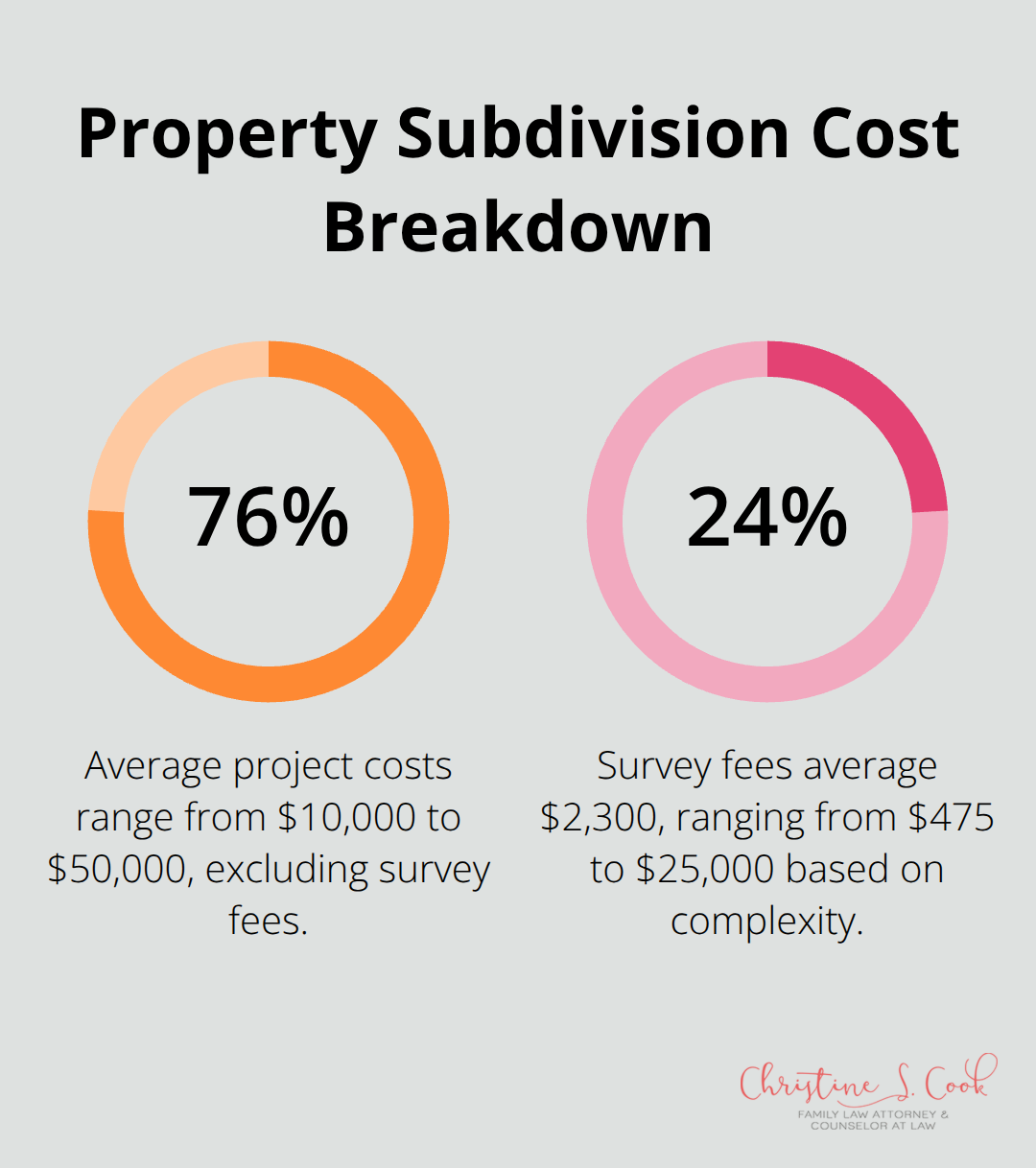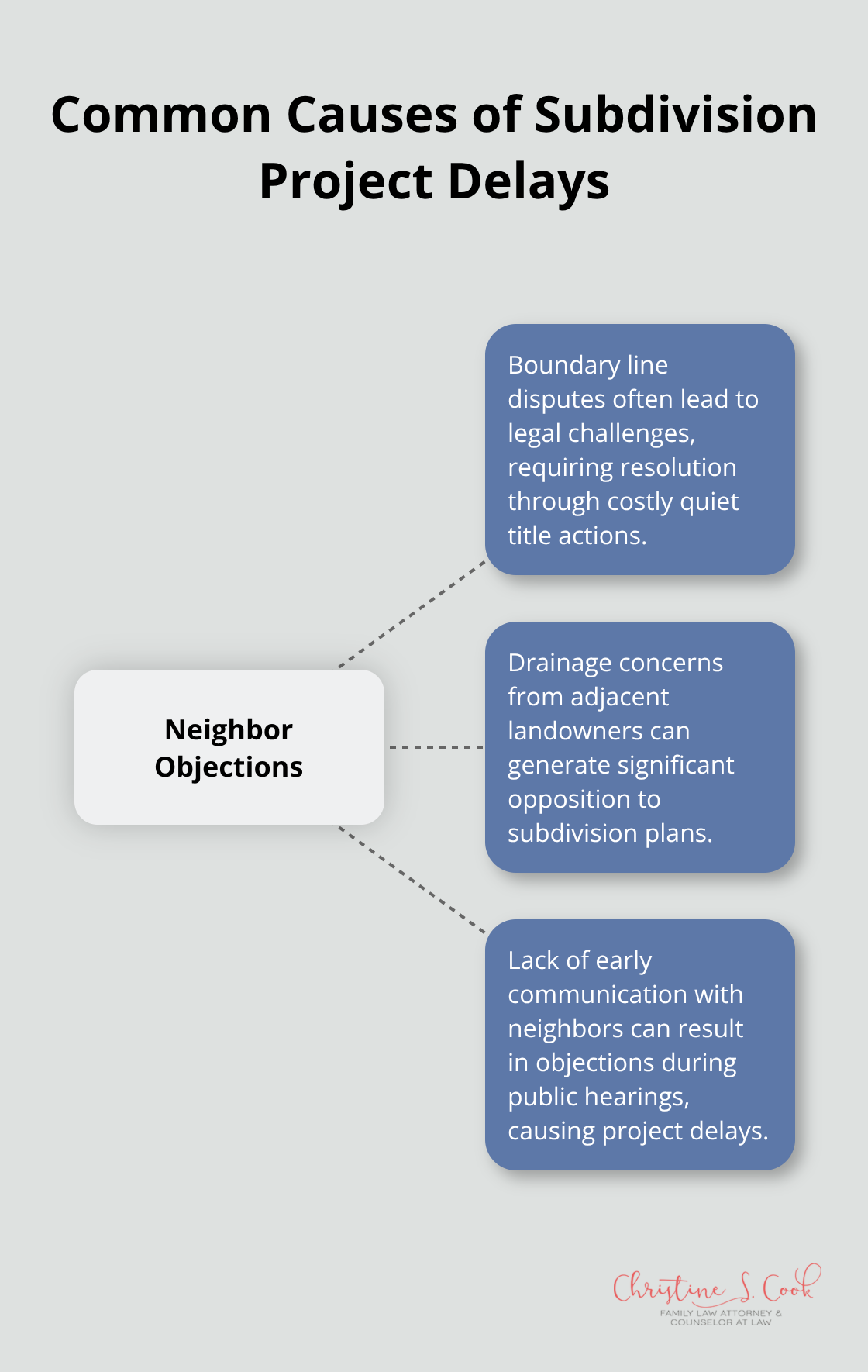Property subdivision can transform a single parcel into multiple valuable lots, but the process involves complex legal and regulatory requirements that trip up many property owners.
We at Christine Sue Cook, LLC have guided countless clients through successful subdivision projects. The key lies in understanding zoning laws, managing costs, and navigating municipal approval processes effectively.
This guide breaks down each step to help you avoid common pitfalls and maximize your property’s potential.
Property subdivision divides one parcel into multiple lots through a formal legal process that requires surveys, plans, and municipal approvals. The National Association of Realtors reports subdivision costs typically range from $10,000 to $50,000 per project, with survey fees averaging $2,300 but ranging from $475 to $25,000 depending on property size and complexity.

Zoning regulations vary dramatically between municipalities, but most require minimum lot sizes of 10,000 square feet for residential subdivisions served by municipal water and sewerage, plus setback requirements of 15 to 25 feet from property lines.
Subdivision makes financial sense when the combined value of individual lots exceeds the original property value plus all subdivision costs by at least 30 percent. Properties in high-demand areas with good school districts and infrastructure access show the strongest returns.
A $200,000 acre that subdivides into four $80,000 lots generates $320,000 gross revenue. After $35,000 in subdivision costs and expenses, net profit reaches $85,000. Properties without existing utilities face additional infrastructure costs of $15,000 to $30,000 per lot for water, sewer, and electrical connections.
Local planning departments require preliminary plats that show proposed lot boundaries, drainage plans, and utility connections before they issue subdivision permits. Most municipalities mandate 5 percent of total land area be dedicated to public use or parkland (which reduces sellable acreage but speeds approval processes).
Environmental impact assessments become mandatory for properties near wetlands or flood zones, which adds 60 to 90 days to approval timelines. Subdivision applications face rejection rates of 15 to 25 percent nationally, with non-compliance to setback requirements and inadequate drainage plans as primary causes.
Infrastructure connection fees often surprise first-time subdividers. Water and sewer tap fees range from $2,500 to $8,000 per lot in most municipalities. Road improvements may require additional investment of $10,000 to $25,000 per project (depending on local standards and existing conditions).
Legal fees for permit applications and document preparation typically cost $5,000 to $12,000. Engineering studies for drainage and utility plans add another $8,000 to $15,000 to project budgets.
The next phase involves the actual step-by-step process of obtaining surveys and navigating the municipal approval system.
Professional land surveyors create detailed boundary maps that form the foundation of your subdivision project. The American Congress on Surveying and Mapping reports that boundary surveys cost between $500 to $2,000 per lot, with complex terrain adding 40 to 60 percent to base fees.
Licensed surveyors must identify existing easements, encroachments, and utility lines before they establish new property boundaries. Site plans require topographic surveys that show elevation changes, drainage patterns, and soil conditions. These documents cost $3,000 to $8,000 for typical residential subdivisions but become mandatory for municipal approval processes.
Planning departments require preliminary plat submissions that include survey data, drainage calculations, and utility connection plans. Most municipalities charge application fees of $500 to $2,500 plus additional review fees of $50 to $100 per proposed lot.
The International City/County Management Association reports average approval timelines of 90 to 120 days for compliant applications, but incomplete submissions face delays of 6 to 12 months. Public hearing requirements add 30 to 45 days to approval schedules in most jurisdictions (with some extending even longer during busy seasons).

Planning boards review applications to provide adequate facilities for housing, transportation, and distribution, primarily focusing on drainage plans and setback measurements.
Civil engineers design storm water management systems that meet local drainage standards, typically costing $8,000 to $15,000 for residential subdivisions. Road construction contractors install required infrastructure improvements including curbs, gutters, and street paving at costs ranging from $15 to $35 per linear foot.
Utility companies require separate permits for water, sewer, and electrical connections with installation timelines of 4 to 8 weeks per service type. Contractors must obtain performance bonds before municipalities issue construction permits (which protects both the developer and municipality from incomplete work).
Even with proper planning and professional guidance, subdivision projects face common obstacles that can derail timelines and budgets if not addressed proactively.
Regulatory delays and unforeseen events can result in project changes, delays, reduced revenues, or increased costs according to the Urban Land Institute. Planning departments reject applications when storm water calculations fail to meet local standards or when proposed lot sizes fall below minimum requirements. Incomplete drainage plans and setback violations cause most rejections.
The solution involves hiring civil engineers before you submit preliminary plats rather than after rejection notices arrive. Engineers familiar with local drainage ordinances prevent the most common compliance issues that add 4 to 6 months to approval timelines.
Construction projects face multifaceted factors causing cost escalations. Soil conditions and utility complications drive most cost escalations. Geotechnical surveys cost $3,000 to $5,000 but prevent expensive surprises during construction when unstable soils require specialized foundations or drainage systems.
Utility connection fees often double initial estimates when existing infrastructure proves inadequate for additional loads. Property owners should budget an additional 25 percent contingency fund beyond all estimated costs. Secure financing commitments that account for potential overruns before you start the subdivision process.
Neighbor objections delay 30 percent of subdivision applications according to the American Planning Association. Boundary line disputes and drainage concerns generate most opposition. Property owners must provide written notification to adjacent landowners 30 days before they file preliminary plats in most jurisdictions.
Survey discrepancies create legal challenges that require resolution through quiet title actions (costing $8,000 to $15,000 in legal fees). Professional surveyors should stake proposed lot boundaries and meet with neighbors before formal applications to address concerns early and prevent costly delays during public hearings.

Existing utility systems often lack capacity for additional connections, forcing developers to pay for system upgrades. Water main extensions cost $50 to $150 per linear foot when municipal systems cannot handle increased demand. Sewer capacity issues require pump station installations that add $25,000 to $75,000 to project budgets.
Road access requirements frequently demand improvements to existing streets. Municipal engineers may require traffic studies costing $5,000 to $12,000 when subdivisions add significant vehicle trips to local roads (particularly in residential areas with narrow streets or limited turning radii).
Property owners who budget 25 percent above estimated costs and hire qualified engineers before they submit applications avoid most common pitfalls that derail subdivision of property projects. Projects with proper survey work, drainage calculations, and neighbor communication face approval rates above 85 percent compared to incomplete applications that experience lengthy delays. The subdivision process demands compliance with complex zoning regulations, environmental assessments, and infrastructure requirements that vary significantly between municipalities.
Legal guidance becomes essential when property owners deal with boundary disputes, utility complications, or regulatory rejections that threaten project viability. Subdivision involves significant financial risk and legal complexity that requires experienced counsel to navigate successfully. Professional legal assistance protects your investment and helps avoid costly mistakes during the subdivision process (which can save thousands in potential delays and rework).
We at Christine Sue Cook, LLC provide compassionate legal support for complex real estate issues. Property owners should secure adequate financing, hire qualified surveyors, and consult with legal professionals who understand local regulations before they start their subdivision project. These foundational steps position your project for approval and profitability while they minimize regulatory delays and cost overruns.
